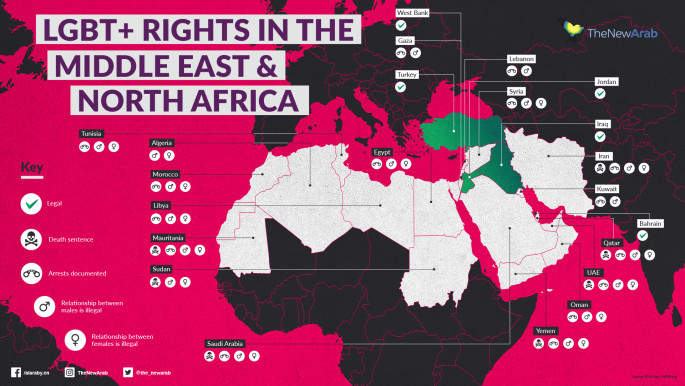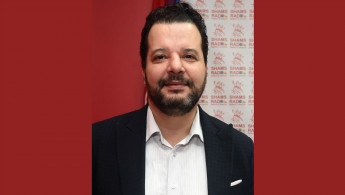Meeting Mounir Baatour: Tunisia's first gay presidential candidate who wants to fight for individual rights
Mounir Baatour, 48, lawyer, head of the Tunisian Liberal Party and well-known supporter for LGBT rights, announced two weeks ago he would contest in country's presidential elections in November.
He is the first gay person to run for president in the Arab region where homosexuality is mostly outlawed.
The New Arab: Why did you decide to bid for presidency?
Mounir Baatour: After years of fighting for individual liberties and minority rights, I realised there is no progress on these matters and no one can do the job better than me.
What makes you the best presidential candidate?
I have a broad vision of the change Tunisia needs.
First and foremost, it needs a third republic with a new constitution, changed through popular referendum, that gives the president of the republic stronger executive power and scope of intervention in the economic, social, educational and cultural fields.
Under the current charter, the president is responsible for the general state of defence, foreign policy and national security only, which reduces his action significantly.
 |
He is the first gay person to run for president in the Arab region where homosexuality is mostly outlawed |  |
If you become president, what will be your set priorities for Tunisia?
The first thing I will do is to liberalise the economy and relegate the government's responsibility to education, health care, security and defence. Everything else falls to the private sector.
Then, I will remove any prior authorisation to investment. I will also remove the governor's authorisation for any purchase or sale of real estate by foreigners in Tunisia, so to boost foreign direct investment.
This will enable to refloat the state coffers, increase salaries and the purchasing power of Tunisians.
Moreover, I will change the national currency in order to integrate the informal economy into the formal and taxable economy. The informal sector will be obliged to pass the money that circulates in the dark through the banks. This would help trace the funds, increase the tax revenues of the state and raise the social benefits.
I have a whole agenda targeting individual freedoms, of course. I am keen on abolishing the death penalty. I will decriminalise homosexuality, and make homophobia an aggravating factor in the cases of intimidation, aggression or rape against gay people.
I will prohibit the use of personal data (social media activity, chats, photos and videos on mobile phones and computers) as evidence that incriminates homosexuals. I will ensure equal access to the law for LGBT individuals since, right now, they can risk being arrested on homosexuality charges when going to police to report hate crimes.
I will also amend Article 226 of the Penal Code which, in its vague formulation, criminalises offences to "public decency", and specify that exhibitionism, instead, should be punished.
 |
|
At the end of June, Tunisia saw a double terror attack, the last in several attacks carried out on its soil over the past few years. How do you intend to counter terrorism and guarantee security in the country?
I believe terrorism has an ideological incubator which is political Islam. Those suicide bombers are indoctrinated on the basis of this incubator of extremism.
This is why I believe that basic principles of Islamic teachings need to be reviewed in school curriculums, and all the verses that call for violence and jihad have to be taken out.
You say Tunisia needs a democratic programme. How do you plan to democratise Tunisia while it is passing through a yet fragile phase of democratic transition?
By giving more weight to local institutions. Each region, based on its needs and means available, should have the authority to decide in the realms of education, culture, tourism, transportation etc.
More decentralisation means more democracy. Then, I'm for a two-round system for the election of legislative bodies where elected individual candidates will be accountable in their respective constituencies.
You are co-founder of the first Tunisian LGBT rights organisation Shams. You were arrested on sodomy charges and sentenced to three months in prison back in 2013. Now, you have made this bold move of embarking on your candidacy. Do you stand any chance of being elected president?
I do, like any other candidate does. I have very good knowledge of my country's problems, I have a very thorough programme, and I count on the support of those who will vote for me.
The fact that I'm gay is just a detail that should not interfere in this election. I want voters to evaluate my candidacy according to my programme as well as my background of an activist who's been fighting for years for individual liberties and rights of minorities.
 |
The fact that I'm gay is just a detail that should not interfere in this election |  |
Under Article 230 of the Penal Code, homosexuality is punishable by up to three years in jail in Tunisia. Besides this, authorities routinely arrest men they suspect of being gay and subject them to anal tests. How can you decriminalise such a taboo matter, given the conservative mentalities in the Tunisian society?
In 1956, President Bourguiba banned polygamy, allowed abortion and adoption, and prohibited the repudiation of women.
These reforms were put through at a time when the Tunisian people were very conservative and illiteracy was over 80 percent, but there was enough political will on the part of Bourguiba to impose these reforms.
This was done over 60 years ago and is accepted as normal today. So political will is needed from the one who leads the state to depenalise homosexuality then the people will adapt.
Regardless of the outcome of the upcoming elections, your presidential bid is going to spark debate over sexual minorities. Could this be a chance to open discussion around diversity in Tunisia?
What I wish to do is to put the question to the other candidates and get them to state their opinion clearly on the rights of sexual minorities and on the necessity to end discrimination, persecution and incarceration of homosexuals.
Some Islamists claim that homosexuality is a mental illness, I say to them: if it's an illness, would you put people suffering from diabetes or hypertension in prison?
Alessandra Bajec is a freelance journalist currently based in Tunis.
Follow her on Twitter: @AlessandraBajec


![President Pezeshkian has denounced Israel's attacks on Lebanon [Getty]](/sites/default/files/styles/image_684x385/public/2173482924.jpeg?h=a5f2f23a&itok=q3evVtko)



 Follow the Middle East's top stories in English at The New Arab on Google News
Follow the Middle East's top stories in English at The New Arab on Google News


